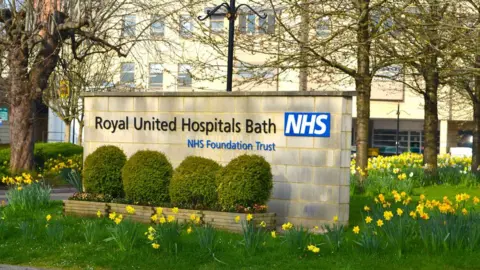Bath NHS trust to test AI's ability to identify blood clots in patients
 RUH Bath NHS Foundation Trust
RUH Bath NHS Foundation TrustAn NHS trial will test whether artificial intelligence (AI) can spot blood clots in patients' lungs faster and more accurately than doctors.
An £830,000 grant has been awarded to the Royal United Hospitals (RUH) Bath NHS Foundation Trust by an NHS programme to promote innovations.
The trial aims to diagnose patients at risk of pulmonary embolic disease as fast as possible.
The condition happens when blood clots cause blockages in lung arteries.
Radiologists at the RUH will partner with healthcare AI companies AIDOC and IMBIO to analyse Computerised Tomography (CT) scans of patients with suspected pulmonary emboli, to see whether the diagnosis of blood clots can be made quicker and more accurately.
They hope to use AI technology to recognise patterns in CT scans of at-risk patients more efficiently than a doctor might.
Jonathan Rodrigues, RUH consultant cardiothoracic radiologist, who is leading the study, said: "We hope that by working with our AI partners, using the very latest artificial intelligence tools, we can help to save lives and get the very best value for money for the NHS."
Prof Jay Suntharalingam, director of the Bath Pulmonary Hypertension Service, said: "The RUH provides specialist pulmonary hypertension care to approximately 4m people in our region. I am excited that we will be continuing our work with the University of Bath to develop our own AI tool."

Follow BBC West on Facebook, Twitter and Instagram. Send your story ideas to: [email protected]
